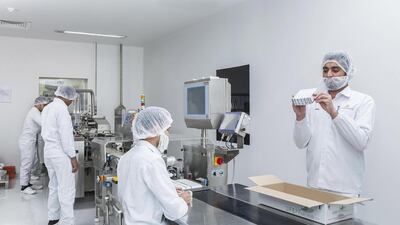Construction at the Khalifa Industrial Zone Abu Dhabi (Kizad) was supposed to begin last year and it was intended to be operational this year.
The pharmaceutical company now expects to start making oncology medications from the Dh547 million facility next year, looking to tap into the UAE’s Dh10 billion pharmaceutical market.
“The first products are under development in research facilities in India, Europe, Canada and Jordan, and once our own facility is ready in Kizad, we will start building research and development here,” said Dev Kumar Singh, the president of Life Pharma, based in Dubai’s Jebel Ali.
Life Pharma announced in 2014 that it would be the Arabian Gulf region’s first pharmaceutical research and manufacturing plant to produce anticancer drugs, making them in Kizad, the free zone area where industrial companies are expanding.
Spending on pharma products in the UAE is expected to be Dh13.97bn in 2019, up from Dh10.32bn last year, an 8.1 per cent growth rate per year, according to research company BMI.
Besides the cancer research facility and manufacturing plant, the centre will also produce vaccines, sterile injections and treatments for illnesses such as hepatitis and influenza.
The Kizad facility, in its first year of operations, will make 15 generic anticancer medications and expects that to eventually increase to 70. It would start with exporting the products to countries in the Middle East, South East Asia, Africa and Russia and the CIS countries.
The first phase would employ 150 people and the finished facility would employ 1,000 people. Once complete, it will be spread over 1.7 million square feet.
Life Pharma expects to have a turnover of US$14m this year, up from $3m last year, based on the increased number of medicines and larger volumes for more markets. This year, it expects to make 44 products, up from 20 last year, and export to markets such as Australia, South Africa, Canada, Taiwan, Hong Kong and Mauritius. In two years, it expects to enter the United States.
Its major markets in terms of sales are the UAE and Iraq, with African and South East Asian countries making up the rest.
Life Pharma’s Jebel Ali facility uses about 20 per cent of its capacity and the company expects to ramp up production this year.
“The challenges that local pharma manufacturers here face include the unavailability of local talent, which increases the cost of manufacturing,” Mr Singh said. “But in the next 10 years, the UAE will be one of the largest pharma markets given it is a hub, and is located favourably to Africa, South East Asia and Europe.”
Life Pharma has tie-ups with global pharma companies such as US-based Abbott Laboratories, Swiss company Acino and Canadian group Apotex. Stricter regulations and better quality control compared with India means the UAE is increasingly attractive to drug companies.
The UAE has 16 pharmaceutical manufacturing plants, but that number is expected to more than double in the next five years to 34, said Amin Al Amiri, the assistant undersecretary of public health policy and licensing at the Ministry of Health, in an interview in February.
ssahoo@thenational.ae
Follow The National's Business section on Twitter

